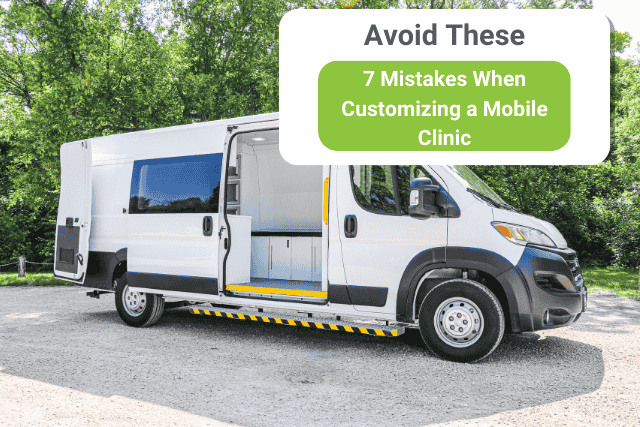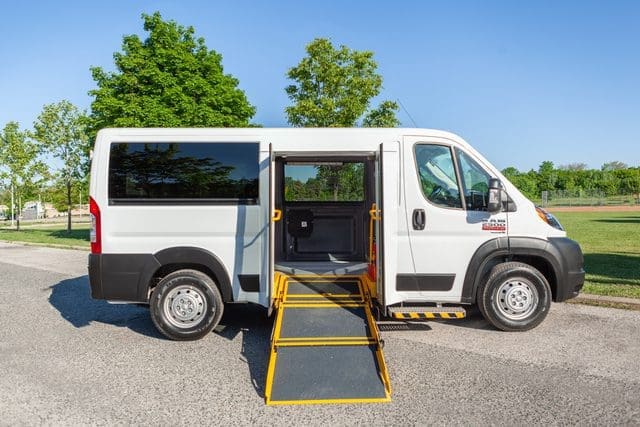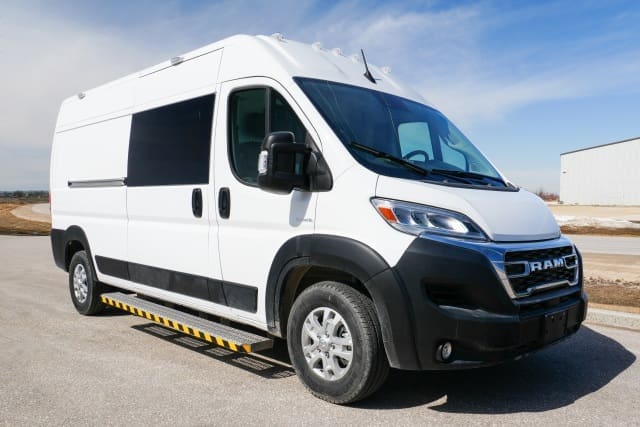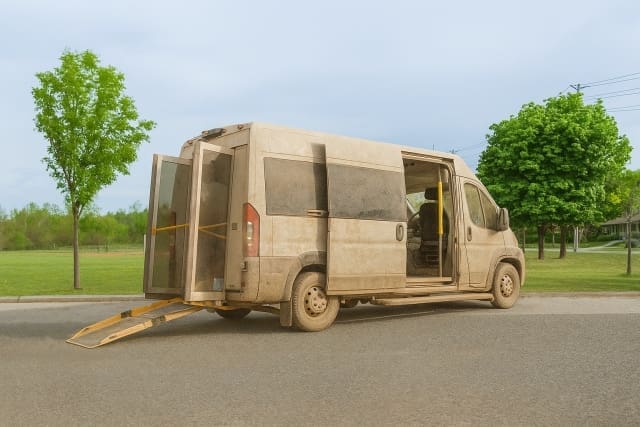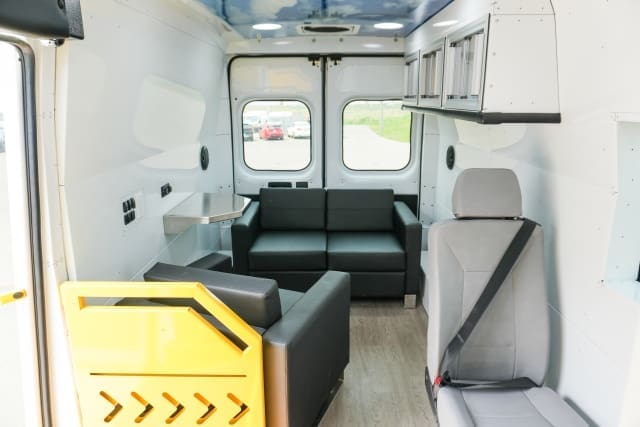Have you ever bought something important and later realized it didn’t really meet your needs? Customizing a mobile clinic can feel the same way if it’s not done properly. Imagine dealing with issues like:
- Not enough room for your medical equipment.
- A layout that makes it harder to do your job.
- Accessibility problems for your patients.
- A frustrating setup that leaves you feeling stuck.
At MoveMobility, we’ve worked with healthcare providers all across Canada, from busy cities like Montreal to smaller communities in Manitoba, to design mobile clinics that make healthcare more accessible. We’ve built a lot of mobile clinics, and our two decades of experience means we know what works—and what doesn’t.
This article will walk you through the most common mistakes in mobile clinic customization and how you can avoid them. By the end, you’ll feel confident about making the best choices for your mobile clinic.
Let’s jump in!
Steer clear of these 8 mistakes in mobile clinic customization
When your organization is working with a manufacturer that’s customizing a mobile clinic for you, it always helps to have a guide that steers you in the right direction. Try to avoid the following seven mistakes with mobile clinic customization.
1. Lack of a solid plan
Imagine trying to bake a cake without a recipe. You’d be left guessing how much of each ingredient to use, and the result might not turn out how you hoped. Designing a mobile clinic without a proven floor plan is just as risky. It’s much easier—and more effective—to follow a plan that’s already been tested and works well.
Using a successful floor plan is like having a recipe that’s been perfected:
It saves time: You won’t waste energy trying to figure out what might work. A good plan already accounts for common challenges.
It reduces guesswork: You can focus on getting the results you want instead of worrying about fixing mistakes later.
It provides consistency: A solid plan ensures your mobile clinic works smoothly for your team and is welcoming for patients.
Across Canada, healthcare providers face unique needs in places like Halifax or rural areas in Saskatchewan. A reliable floor plan helps you deliver care efficiently, no matter where you are.
2. Not keeping it simple
It’s tempting to make your mobile clinic stand out by adding all kinds of unique features right away. But over-customizing can backfire.Healthcare needs change over time, and if your clinic is built for one specific purpose, it might not work as well down the road. It’s a bit like buying the latest phone only to realize a newer model comes out six months later.
Why is simplicity important when customizing a mobile clinic?
Flexibility for the future: Over-customization can make your clinic outdated faster, limiting its use as your needs evolve.
Cost efficiency: Complicated features can tie up funds that could be better spent on patient care or other essentials.
Ease of use: A clinic with too many bells and whistles might make it hard for your team to operate smoothly, especially if they’re learning new systems.
In bustling hubs like Edmonton to smaller communities in New Brunswick, healthcare teams benefit from mobile clinics that are both creative and practical. Keeping the design simple ensures your clinic is effective and user-friendly for years to come.
3. Assuming the biggest mobile clinic is the best
When you think about mobile clinics, you might assume bigger is better. But that’s not always true! A huge vehicle, like a bus or RV, can be tough to drive and park, especially in busy cities or narrow rural roads. Picking the right size for your mobile clinic is super important.
Here’s why smaller clinics are often a great idea:
Easier to get around: A smaller vehicle is simple to drive and can fit into tighter spaces, which is helpful in crowded areas or small towns.
More welcoming for patients: Big vehicles can feel a bit overwhelming. Smaller clinics feel friendlier and more personal, making it easier for patients to relax.
Helps build trust: A cozy space feels more comfortable, like sitting down with your doctor in a small, private office instead of a giant, busy room.
From the streets of downtown Toronto to rural roads in Alberta, a smaller mobile clinic can make healthcare easier to deliver and more approachable for your patients.
4. Not thinking about the future
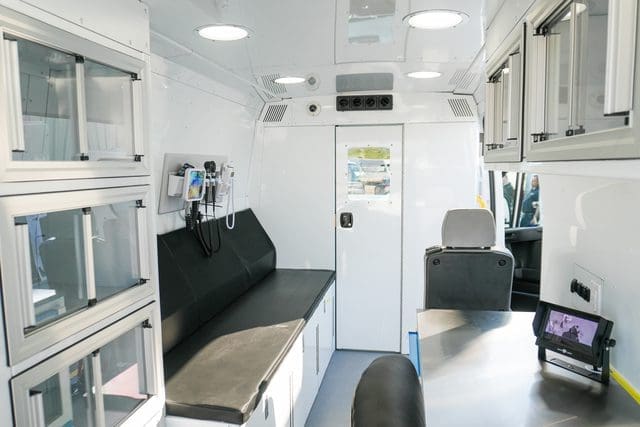
No one can predict the future. Plans can change because of funding issues, personal challenges, or shifts in your organization’s priorities. That’s why it’s important to think about resale value when you’re customizing a mobile clinic. Picking a design and vehicle that’s easy to sell later can save you a lot of stress down the road.
Here’s how planning for resale can help:
Protects your investment: A mobile clinic that’s appealing to future buyers means you’re less likely to lose money if you need to sell.
Keeps your options open: Life happens, and having a clinic that’s easy to sell gives you flexibility to adapt.
Helps you stay confident: Knowing you’ve chosen a design that works now and will appeal to others later gives you peace of mind.
Imagine it like having a backup plan in your pocket. Even if you never use it, it’s reassuring to know it’s there. If you’re running a mobile clinic in urban areas like Vancouver or smaller communities in Nova Scotia, planning for resale is a smart way to protect your investment.
5. Forgetting about your budget
It’s easy to get excited about all the cool features you can add to your mobile clinic, but forgetting to plan for some of the customization costs can cause big problems later. Customizing a clinic costs money, and it’s important to think about everything—like if you’ll need a sink, fridge, and other features you need—before jumping in.
Here’s how to avoid money troubles:
Plan for everything: Don’t just think about the upfront cost. Remember to budget for things like equipment, training, and maintenance. It all adds up!
Stick to what you need: Focus on features that will really make a difference instead of going overboard with extras.
Leave room for surprises: Always set aside a bit more than you think you’ll need for unexpected costs.
Think of it like planning a big family trip across Canada. You’d budget for gas, meals, and hotels—and you’d probably leave a little extra for those unexpected stops or surprises. Taking the same approach with your mobile clinic can help you stay in control of your project and avoid financial stress.
6. Not relying on the experts
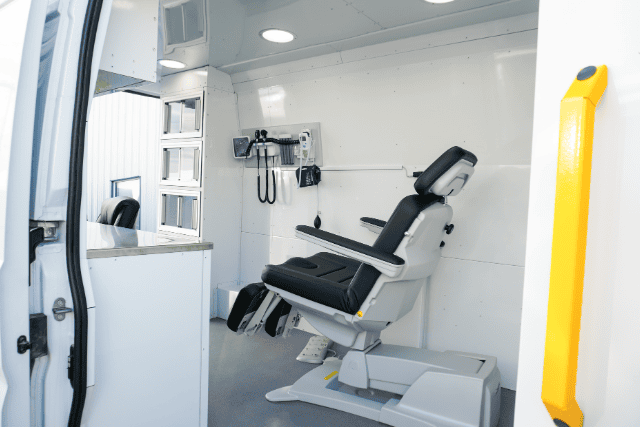
Trying to build your own mobile clinic might sound like a fun challenge, but it’s more complicated than you think. A do-it-yourself vehicle may not have the right systems for healthcare, like proper ventilation, reliable heating and cooling, or enough space for equipment. Even small oversights can cause big problems later on.
Here’s why going DIY can backfire:
Safety can be overlooked: When you’re not experienced in medical-grade design, it’s easy to miss critical details that keep patients safe.
It’s a puzzle with no instructions: Everything in a mobile clinic needs to fit and work together perfectly. Without professional knowledge, it’s hard to make that happen.
It may cost you more in the end: If something isn’t done right, you’ll spend extra time and money fixing it—or starting over completely.
Think of it like building a car from scratch instead of buying one ready-to-go. It might seem cheaper at first, but without expertise, you’re likely to run into issues that could leave you stuck. Across Canada, from Calgary to rural Quebec, healthcare providers rely on experts to design clinics that meet strict standards and deliver excellent care.
7. Not thinking about your target market
Who are you trying to help with your mobile clinic? It’s an important question that some people overlook. Mobile clinics have the power to reach those who don’t visit traditional healthcare centre. When you get a mobile clinic designed with your target market in mind, you can make a bigger difference.
Here’s why understanding your audience matters:
You’ll reach the right people: Knowing your patients’ needs ensures you’re equipped to serve them effectively, whether it’s offering mental health support or basic medical care.
You’ll avoid missing key features: Planning without thinking about your patients could leave you without the right features or accommodations, like a winter-ready vehicle or the ability to store vaccines.
It helps build trust: When your clinic is designed with care and consideration, it shows patients that their well-being is a priority.
Imagine planning a team road trip without knowing who’s coming along. You might bring too much gear or leave out what’s most important. Across Canada, from urban hubs like Toronto to remote areas in Nunavut, mobile clinics designed with the end user in mind are changing lives by bringing healthcare to people who need it most.
8. Ignoring the importance of staff comfort
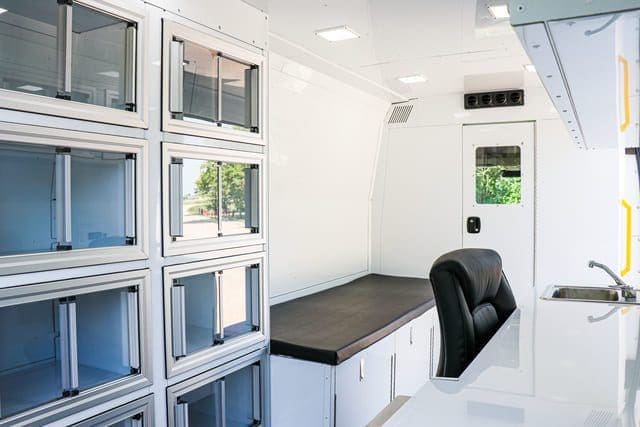
When designing a mobile clinic, it’s easy to focus only on your patients. But your staff are just as important! If the people working inside the clinic aren’t comfortable, it can lead to frustration, tiredness, and even mistakes. A happy, comfortable team works better, which means better care for everyone.
Why does staff comfort matter?
Helps things run smoothly: A smart layout makes it easier for staff to grab supplies and move around without wasting time.
Keeps spirits high: Comfortable chairs, good lighting, and proper heating or cooling make long shifts much easier.
Reduces strain: Cramped spaces or bad design can cause aches and pains, making it harder for staff to do their job well.
It’s like setting up a workspace at home. If the chair is wobbly and there’s no good lighting, it’s tough to concentrate. When you have a well-designed space for your team, you’re ensuring that your patients will also be getting better care.
Make the right choices with your mobile clinic
You likely landed on this article because you felt like getting the right mobile clinic is feeling like a big challenge. Maybe you’re worried about making mistakes with the layout, choosing the wrong size, or staying on budget. Whatever brought you here, you’re looking for answers—and now you’ve got them!
At MoveMobility, we’ve helped healthcare teams and organizations all across Canada create mobile clinics that are safe, reliable, and ready to serve their communities. Take a look at one of our past clients: the Quest Community Health Centre’s mobile clinic.
We believe in making healthcare accessible for everyone and building clinics that make life easier for patients and staff alike. If you have questions or want to start planning your clinic, click the button below to connect with a mobility expert—we’re here to help.
If you’re not ready to chat just yet, check out our other helpful resources to learn more about mobile clinics!
Start by learning how much you can expect to pay for a Mobile Clinic Van by checking out the video below.
After that, check out our article on how to choose the right mobile medical van manufacturer. Deciding on the right one is another step that will help you avoid mistakes in mobile clinic customization.


